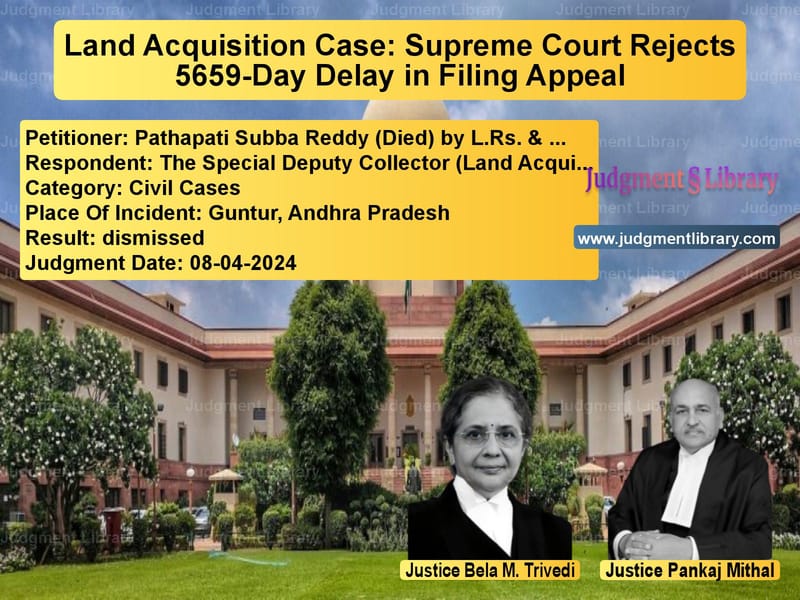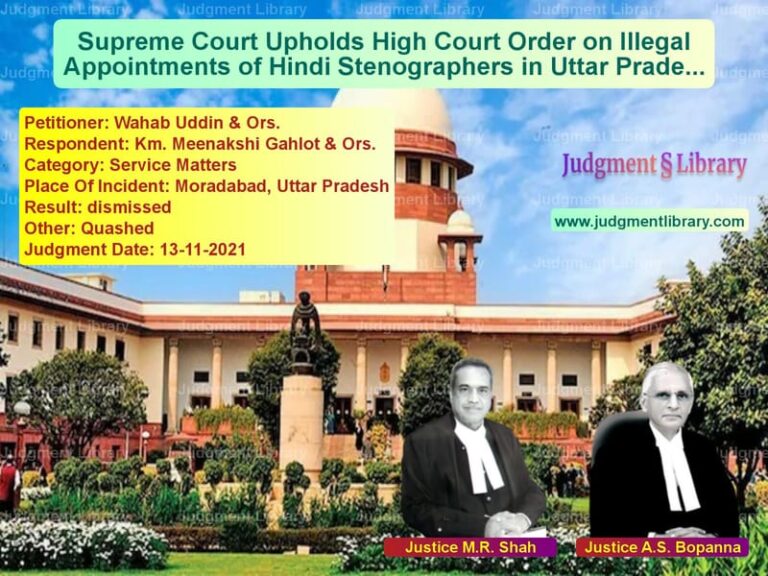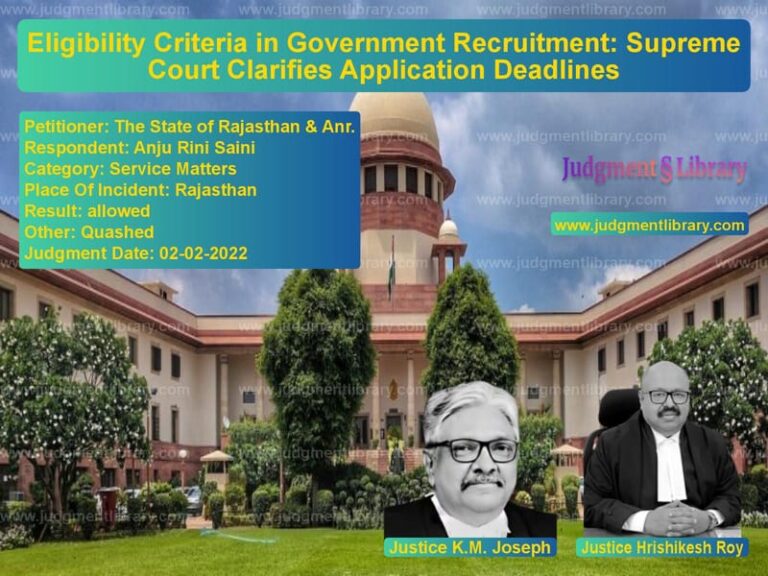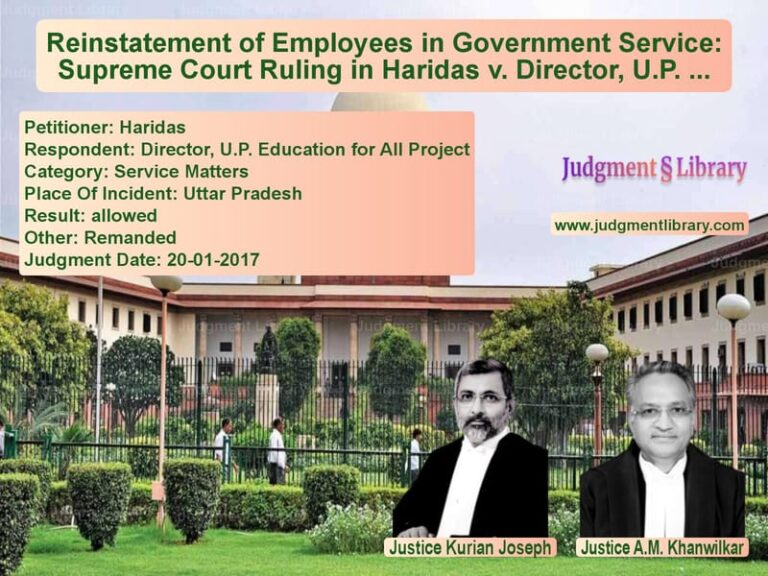Land Acquisition Case: Supreme Court Rejects 5659-Day Delay in Filing Appeal
The case of Pathapati Subba Reddy (Died) by L.Rs. & Others vs. The Special Deputy Collector (Land Acquisition) revolves around a dispute concerning land acquisition compensation under the Land Acquisition Act, 1894. The Supreme Court had to determine whether a delay of 5659 days (over 15 years) in filing an appeal against the rejection of a compensation claim should be condoned.
Background of the Case
In 1989, land in Gandluru, Guntur District, Andhra Pradesh was acquired for the Telugu Ganga Project. The compensation offered under the initial award was deemed unsatisfactory by the landowners, leading to a reference under Section 18 of the Land Acquisition Act. The reference case (L.A.O.P. No. 38 of 1990) was filed before the Additional Senior Civil Judge, Gudur, by 16 claimants.
However, during the pendency of the case, three claimants, including Pathapati Subba Reddy (Claimant No. 11), passed away, and no steps were taken to substitute their legal heirs. The reference court dismissed the claim on 24th September 1999, upholding the compensation awarded by the collector.
More than 15 years later, in 2015, legal heirs of one deceased claimant (Claimant No. 11) sought to challenge the rejection by filing an appeal before the High Court. This appeal was filed with a delay of 5659 days, prompting an application for condonation of delay.
The Uttarakhand High Court rejected the condonation request, stating that the appellants had not provided a satisfactory explanation for the delay. The claimants then approached the Supreme Court.
Arguments by the Petitioner (Legal Heirs of Pathapati Subba Reddy)
- The delay was due to the fact that the legal heirs were unaware of the reference proceedings and only came to know about the rejection in 2015 when one of them visited the Land Acquisition Office.
- Since their father (Claimant No. 11) passed away in 1995 and no substitution was made, they were denied an opportunity to contest the matter earlier.
- Other similarly placed claimants in different cases had been granted enhanced compensation, and they should not be deprived of the same benefit.
- The law favors justice over technicalities, and the delay should be condoned to ensure fair compensation.
Arguments by the Respondent (Special Deputy Collector, Land Acquisition)
- The delay of over 15 years was extraordinary and inexcusable.
- Other claimants from the same reference case had accepted the judgment, indicating that the matter had reached finality.
- The law of limitation is based on public policy, and condoning such a massive delay would set a wrong precedent.
- The petitioners had not shown sufficient cause for the delay, as required under Section 5 of the Limitation Act, 1963.
Supreme Court’s Analysis and Judgment
The Supreme Court upheld the High Court’s rejection of the appeal, citing the following key reasons:
- Law of limitation: “The law of limitation is founded on public policy. It is enshrined in the legal maxim interest reipublicae ut sit finis litium—it is for the general welfare that litigation should come to an end.”
- Mandatory nature of limitation laws: “Section 3 of the Limitation Act mandates that any appeal filed after the prescribed period shall be dismissed, even if limitation is not raised as a defense.”
- No sufficient cause for delay: “Even though courts adopt a liberal approach in condoning delays, there has to be sufficient cause. Here, the petitioners were negligent in pursuing their case.”
- Merits of the case cannot override limitation: “While compensation matters are important, allowing such excessive delays would defeat the purpose of limitation laws.”
- Finality of litigation: “Once other claimants from the same reference case accepted the judgment, allowing one set of heirs to reopen the case after 15 years would create uncertainty.”
The Supreme Court dismissed the petition, refusing to condone the delay, and observed:
“The concepts such as ‘liberal approach’, ‘justice-oriented approach’, and ‘substantial justice’ cannot be employed to jettison the substantial law of limitation. Delay cannot be condoned on sympathetic grounds alone.”
Conclusion
The Supreme Court’s judgment reaffirms the importance of adhering to statutory timelines in legal proceedings. It emphasizes that limitation laws exist to provide certainty and closure, preventing cases from being indefinitely revived. While courts may adopt a flexible approach in condoning minor delays, extraordinary delays like 5659 days must be backed by compelling reasons, which were absent in this case. This ruling serves as a critical precedent in land acquisition disputes and the application of limitation laws in India.
Petitioner Name: Pathapati Subba Reddy (Died) by L.Rs. & Others.Respondent Name: The Special Deputy Collector (Land Acquisition).Judgment By: Justice Bela M. Trivedi, Justice Pankaj Mithal.Place Of Incident: Guntur, Andhra Pradesh.Judgment Date: 08-04-2024.
Don’t miss out on the full details! Download the complete judgment in PDF format below and gain valuable insights instantly!
Download Judgment: pathapati-subba-redd-vs-the-special-deputy-c-supreme-court-of-india-judgment-dated-08-04-2024.pdf
Directly Download Judgment: Directly download this Judgment
See all petitions in Property Disputes
See all petitions in Landlord-Tenant Disputes
See all petitions in Contract Disputes
See all petitions in Judgment by Bela M. Trivedi
See all petitions in Judgment by Pankaj Mithal
See all petitions in dismissed
See all petitions in supreme court of India judgments April 2024
See all petitions in 2024 judgments
See all posts in Civil Cases Category
See all allowed petitions in Civil Cases Category
See all Dismissed petitions in Civil Cases Category
See all partially allowed petitions in Civil Cases Category







